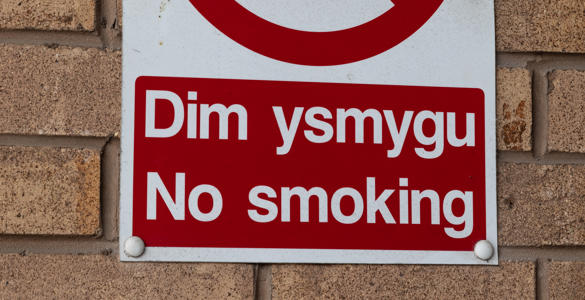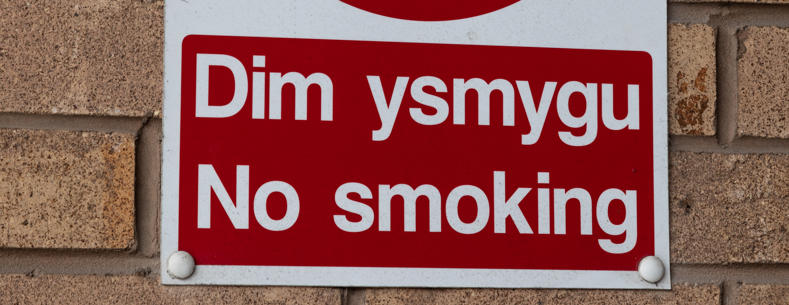Smoking remains the leading cause of preventable ill health and premature death in Wales. Most smokers start as teenagers, and those who begin smoking before the age of 18 are more likely to become addicted, struggle to quit, and face serious health risks later in life. This is notably concerning in Wales, where youth smoking and vaping continue to raise public health concerns.
The UK Government’s Smoke-Free Generation policy aims to break this cycle by banning tobacco sales to anyone born on or after 1 January 2009 – targeting the age when smoking uptake often begins. Across two articles, we explore how the Tobacco and Vapes Bill supports that goal. First, we’re taking a closer look at smoking, and then we’ll turn to vaping – two behaviours with serious implications for public health in Wales.
Progress in Wales: aiming for smoke-free by 2030?
Wales has often led the way in tobacco control:
- In 2007, it became the first UK nation to ban smoking in enclosed public spaces.
- In 2015, smoking in cars with children was banned.
- In 2021, smoke-free zones were extended to hospital grounds, school grounds, public playgrounds, and childcare settings - a UK first.
Over the years, additional measures have been introduced, including raising the legal age to buy tobacco from 16 to 18, banning cigarette vending machines, and requiring shops to keep tobacco products out of sight.
Adult smoking rates have since reduced from 24% in 2007 to around 13% in Wales. Yet the impact of smoking remains significant, with some areas still reporting rates above 17%.
According to the UK Government:
- Smoking causes around 80,000 deaths annually across the UK.
- It costs the NHS £3.1 billion a year and the wider economy £18.3 billion lost in productivity.
- Tobacco is responsible for 1 in 4 cancer deaths and contributes to strokes, heart disease, dementia and asthma.
Tackling inequality
Smoking in Wales reflects wider health inequalities. Smoking rates are higher in deprived communities, among people with mental health conditions, and some ethnic groups.
Among young people aged 11 to 16, 4% report smoking weekly.
In 2023, around 14% of expectant mothers in Wales were recorded as smokers at their first antenatal visit, with that figure falling by the time of birth. Smoking during pregnancy increases the risk of stillbirth, low birth weight, and long-term developmental issues.
A smoke-free Wales by 2030
The Welsh Government’s smoke-free Wales strategy defines “smoke-free” as a smoking prevalence of 5% or less among adults by 2030. Its approach includes:
- Reducing health inequalities.
- Supporting future generations.
- Promoting smoke-free environments.
- Strengthening enforcement.
A key focus is preventing smoking uptake among children and young people through education and youth engagement. However, the most transformative change may come from UK-wide legislation, specifically the Tobacco and Vapes Bill.
Tobacco and Vapes Bill: Key provisions on smoking
The Tobacco and Vapes Bill is in its final stages in the House of Lords, having completed its passage through the House of Commons earlier this year. The Bill proposes bold, UK-wide measures to create a smoke-free generation:
- Smoke-Free Generation: It will be illegal to sell tobacco to anyone born on or after 1 January 2009. The age of sale will increase annually, meaning today’s legal smokers won’t be affected.
- Retail Licensing: Powers to introduce a licensing system for tobacco retailers in England, Wales, and Northern Ireland, and to strengthen Scotland’s existing register.
- On-the-Spot Fines: £200 fixed penalty notice for underage tobacco sales in England and Wales.
- Product Registration: A system to register tobacco products entering the UK market.
- Hospital-Based Support: All hospitals must offer opt-out smoking cessation support.
- Standardised Packaging: The government will explore extending standardising packaging to cigars and pipe tobacco.
Provisions on vaping are covered in our second article. .
Public and political response to the Bill
Polling suggests there’s strong public support for the Bill. A YouGov survey of over 11,000 adults in England found 68% support the ‘Smokefree Generation’ policy. However, some retailers and commentators have raised concerns about:
- The enforceability of the age-based tobacco ban.
- Potential growth of the illicit tobacco market.
- Impacts on personal freedoms, with critics arguing it creates a generational divide.
Wales and the Legislative Consent process
Although health is devolved, the Welsh Government supports the Bill, citing a long tradition of UK-wide collaboration on tobacco control. The Senedd has considered two Legislative Consent Memorandum (LCMs) both supported by a majority of Members. The Welsh Government believes the Bill aligns with its 2030 vision, where:
- Not smoking is the norm for all children and young people.
- All children grow up in smoke-free environments.
- Fewer young people take up smoking.
- Smoking during pregnancy is significantly reduced.
- Young people help shape prevention and cessation services.
A pivotal moment?
The Tobacco and Vapes Bill marks a pivotal step towards a smoke-free Wales. It builds on decades of national and devolved action to reduce smoking-related harm and improve public health. While implementation may present challenges, the Bill introduces measures aimed at protecting future generations from nicotine addiction. In Wales, the next formal step is for the Senedd to debate and vote on the Legislative Consent Motion.
Article by Sarah Hatherley, Senedd Research, Welsh Parliament






